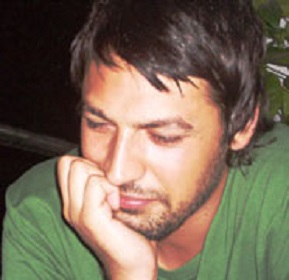De Angolese schrijver José Eduardo Agualusa werd op 13 december 1960 in Huambo geboren. Zie ook alle tags voor José Eduardo Agualusa op dit blog.
Uit: A General Theory of Oblivion (Vertaald door Daniel Hahn)
“I’ve died,” thought Jeremias. “I’ve died, and that gecko is God.”
Even supposing that the gecko was indeed God, he would appear to be hesitating about what fate to assign to him. To Jeremias this indecision was even stranger than finding himself face-to-face with the Creator and the fact that He had taken on the form of a reptile. Jeremias knew, and had known for quite some time, that he was destined to burn for all eternity in the flames of Hell. He had killed, he had tortured. And if he’d started off doing those things out of duty, obeying orders, he had later acquired a taste for it. He only felt awake, whole, when he was racing through the night, in pursuit of other men.
“Make your mind up,” said Jeremias to the gecko. Or rather, he tried to say, but all that came out of his mouth was a dull, tangled thread of sounds. He made a second attempt, and, as in a nightmare, the dark rush of noise came again.
“Don’t try to talk. Actually, you’re not going to talk ever again.” Jeremias believed, for some moments, that it was God who was condemning him to eternal silence. Then he turned his eyes toward the right and saw a hugely fat woman leaning against the door. Her hands, with tiny, fragile fingers, danced before her as she spoke:
“Yesterday they announced your death in the newspapers. They published a photograph, it was quite an old one, I almost didn’t recognize you. They said you were a devil. You died, you were reborn, and you have another chance. Make the most of it.”
Madalena had been working at the Maria Pia Hospital for five years. Before that she had been a nun. A neighbor had witnessed the shooting of the mercenaries at a distance and had notified her. The nurse drove to the site on her own. One of the men was still alive. A bullet had passed through his chest, on a miraculous, perfect course that hadn’t hit a single vital organ. A second projectile had gone into his mouth, shattering his two upper incisors, then perforating his throat.
“I don’t understand what happened. Were you trying to catch the bullet in your teeth?” She laughed, her body shaking. The light seemed to laugh with her. “Yes, sir, those are some good reflexes. And it wasn’t even such a bad idea, either. If the bullet hadn’t found your teeth, it would have taken a different direction. It would have killed you or left you paralyzed. I thought it best not to take you to the hospital. They would take care of you and then when you were recovered they’d only shoot you again. So be patient, and I’ll look after you myself with what little resources there are. I just have to get you out of Luanda. I don’t know how long I’ll be able to hide you. If the comrades find you, they’ll shoot me, too. As soon as possible we’ll travel south.”
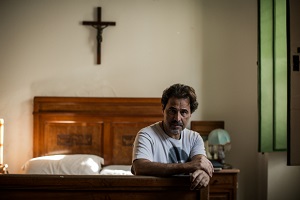
José Eduardo Agualusa (Huambo, 13 december 1960)
De Nederlandse schrijver Anton H.J. Dautzenberg werd geboren in Heerlen op 13 december 1967. Zie ook alle tags voor Anton H. J. Dautzenberg op dit blog.
Uit: Ik bestaat uit twee letters
“13 december 2016 [Tilburg, Carré] Vandaag over een jaar word ik vijftig. Het Jaar van Abraham is begonnen. Ik kan me er nog maar weinig bij voorstellen – vijftig. Een mijlpaal, volgens velen. Ik zie vooral een constructie, een gecultiveerd symbool dat nauwelijks te negeren valt. We hebben blijkbaar behoefte aan piketpaaltjes om het leven te structureren, van betekenis te voorzien.
Dertien vond ik een spannende leeftijd, dat weet ik nog goed, mijn tienertijd was begonnen. En die zou nog lang gaan duren: dertien, veertien, vijftien, zestien, zeventien, achttien, negentien. Er lag een tijdspanne voor me die ik niet kon overzien. De broer van een vriend van me was negentien, hij leefde in een wereld waarvan ik me geen voorstelling kon maken. Eenentwintig, dat getal luidde wéér een nieuwe fase in, of móést een nieuwe fase inluiden. Daarna kwam dertig, drieëndertig, veertig en nu dus vijftig.
Eerlijk gezegd heb ik die laatste ‘mijlpalen’ helemaal niet gevoeld. Misschien komt dat ook doordat ik mijn verjaardag al meer dan dertig jaar niet vier. Gefeliciteerd worden met iets waar ik niets voor heb moeten doen, dat beviel en bevalt me niet. Ik vind het sowieso niet fijn om felicitaties in ontvangst te nemen, ik heb de neiging om ‘prestaties’ tussen aanhalingstekens te zetten. Wellicht een residu van de ziekelijke verlegenheid waarmee ik lang heb geworsteld: let maar niet op mij, ik ben er niet. Vreemd genoeg bleven de prestaties toch komen, een gevolg van een geldingsdrang die ik niet heb kunnen beteugelen en die zich niets van de schaamte lijkt aan te trekken.
Negenenveertig jaar geleden werd ik dus geboren. 13 december 1967. Op een woensdag. Het was een donkere en koude dag lees ik op Datum.nl. ‘Een donkere en koude (max 7,0 °C) dag zonder zon. De lucht was geheel bewolkt, er woei een zwakke wind (2 Bft) met matige windstoten (3 Bft).’ Ik floepte om ongeveer 7.15 uur naar buiten, achteloos achter mijn broer aan. Althans, dat zegt mijn moeder altijd, dat ik moeiteloos naar buiten gleed.
‘Je hebt je broer het werk laten doen en je glipte er daarna gewoon uit.’ Telkens wanneer ze dit zegt – en dat is minimaal één keer per jaar – krijg ik de indruk dat ik daar indertijd bewust voor heb gekozen en dat ik als foetus al wist hoe ik mijn krachten moest verdelen. Ik ben inderdaad assertiever dan mijn broer, dus dat zal ze wel op de geboorte projecteren. Ik liep bijvoorbeeld al na negen maanden, mijn broer pas na vijftien maanden. Misschien was dat een gevolg van mijn baarmoederstrategie: doe jij het zware werk, maak jij de weg maar voor mij vrij. Drie minuten na Hub floepte ik er dus uit, in de Vroedvrouwenschool in Heerlen.”
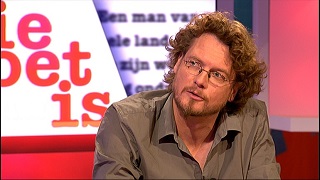
Anton H.J. Dautzenberg (Heerlen, 13 december 1967)
De Amerikaanse dichter en sociaal activist Jack Hirschman werd geboren op 13 december 1933 in New York. Zie ook alle tags voor Jack Hirschman op dit blog.
The Sacificial Lamb
As I slept I heard
you call me in the voice
of our former life,
womanly, resonant, dark
eyelid of voice, voice with child,
voice of older passion, of
our lust and obscenities,
mimosa voice of vining power,
voice of blood and storm
And I went on sleeping,
I could no longer rise to that woman,
she had been wept away,
many tissues at the bedside
of a broken promise of wood,
many tissues in the broken
toilets of the hotel heart
She had arrived at you
called me in the voice of this life,
a girl’s voice, a voice at once
thin as a crik, as a hope like thread,
a fresh whisper of this new karma
of love
I see your confusion clearly
and when I am wide awake
and kiss you,
I pass through the light
water of the mask
and touch that dark ecstasy
again,
who is silent who is otherwise
wiser for the seachange,
who holds us both
loving orphans of her thrall
loving kisses of her continual
rebirth
gathered by our lips from
the scattered rags of air
where she flung herself
one garment-demented day.
1976
Calligraph
for Ruth
Her hair hysterical, thrown back at the sight
Of the rose my throbbing boyhood brought,
Incensed, how the man in me leaped from my blush
And struck a trembling smile upon her mouth,
And how, drawing a tattered kimono close,
With fingers soft as pounded paraffin,
She bent and lifted up a thin-necked vase
To put the flower in.
1956
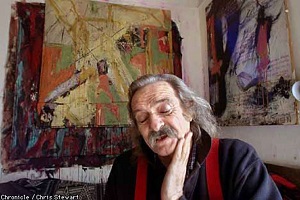
Jack Hirschman (New York, 13 december 1933)
De Roemeense dichter en schrijver Adrian Chivu werd geboren op 13 december 1975 in Boekarest. Zie ook alle tags voor Adrian Chivu op dit blog.
Uit: The Street (Vertaald door Alistair Ian Blyth)
“…and he said no but it was obvious there was something wrong and I asked him have you caught syphilis? because that’s what Cip told us that you can catch it by kissing somebody and you can only get rid of it if you have injections and Romeo said let’s go round the back of the house for a bit and I told him hang on I’ll just drop off my satchel and then I’ll come back and he said bring it with you and I said no wait a bit I’ll be right back and I ran home but neither my mother nor sister were there and I left my satchel in the hall I took a piece of cheese from the fridge I stuffed it in my mouth I went outside and I went with Romeo behind the house and Romeo lit a cigarette leaned against a tree and looked at me frowning and I didn’t know what to do and I put my hands in my pockets and I waited for him to say something and he asked me what are you playing at? and we both heard my auntie calling him Romeo Romeo and he said we’ll talk later and he threw away the cigarette and he was going inside but I followed him and asked what do you mean? and he didn’t answer and my auntie’s top lip was swollen and when she saw me she covered her mouth with her hand and I looked away and she asked me how is it going at school? and she lowered her hand and smiled at me and I said all right and she asked me would you like some syrup? and I said yes thanks and I followed her into the kitchen and I jumped up on to a stool and she opened the fridge and took out the bottle of syrup and Romeo asked her from the doorway what do you want? and my auntie told him not to use that tone and Romeo asked her again in the same tone and she said I don’t want anything and if you’ve got something to say and she poured the syrup into my glass and Romeo said I haven’t got anything to say and my auntie told him I would have explained it to you myself and Romeo said I don’t need you to explain anything to me…”
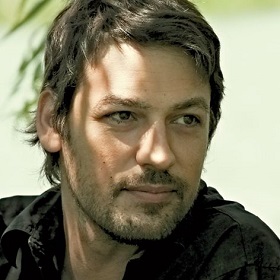
Adrian Chivu (Boekarest, 13 december 1975)
De Duitse dichter Heinrich Heine werd geboren in Düsseldorf op 13 december 1797. Zie ook alle tags voor Heinrich Heine op dit blog.
Dass du mich liebst
Dass du mich liebst, das wusst ich,
ich hatte es längst entdeckt;
doch als du mir gestanden,
hat es mich tief erschreckt.
Ich stieg wohl auf die Berge
und jubelte und sang;
ich ging ans Meer und weinte
beim Sonnenuntergang.
Mein Herz ist wie die Sonne
so flammend anzusehn,
und in ein Meer von Liebe
versinkt es groß und schön.
Der Hirtenknabe
König ist der Hirtenknabe,
Grüner Hügel ist sein Thron;
Über seinem Haupt die Sonne
Ist die große, goldne Kron.
Ihm zu Füßen liegen Schafe,
Weiche Schmeichler, rotbekreuzt;
Kavaliere sind die Kälber,
Und sie wandeln stolzgespreizt.
Hofschauspieler sind die Böcklein;
Und die Vögel und die Küh,
Mit den Flöten, mit den Glöcklein,
Sind die Kammermusici.
Und das klingt und singt so lieblich,
Und so lieblich rauschen drein
Wasserfall und Tannenbäume,
Und der König schlummert ein.
Unterdessen muß regieren
Der Minister, jener Hund,
Dessen knurriges Gebelle
Widerhallet in der Rund.
Schläfrig lallt der junge König:
“Das Regieren ist so schwer,
Ach, ich wollt, daß ich zu Hause
Schon bei meiner Kön′gin wär!
In den Armen meiner Kön′gin
Ruht mein Königshaupt so weich,
Und in ihren schönen Augen
Liegt mein unermeßlich Reich!”
Die Jahre kommen und gehen
Die Jahre kommen und gehen,
Geschlechter steigen ins Grab,
Doch nimmer vergeht die Liebe,
Die ich im Herzen hab.
Nur einmal noch möcht ich dich sehen,
Und sinken vor dir aufs Knie,
Und sterbend zu dir sprechen:
“Madame, ich liebe Sie!”
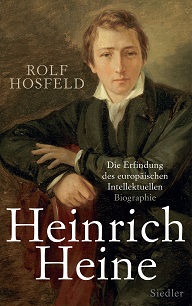
Heinrich Heine (13 december 1797- 17 februari 1856)
Cover biografie
De Amerikaanse dichter Kenneth Patchen werd geboren op 13 december 1911 in Niles, Ohio. Zie ook alle tags voor Kenneth Patchen op dit blog.
The Artist’s Duty
So it is the duty of the artist to discourage all traces of shame
To extend all boundaries
To fog them in right over the plate
To kill only what is ridiculous
To establish problem
To ignore solutions
To listen to no one
To omit nothing
To contradict everything
To generate the free brain
To bear no cross
To take part in no crucifixion
To tinkle a warning when mankind strays
To explode upon all parties
To wound deeper than the soldier
To heal this poor obstinate monkey once and for all
To verify the irrational
To exaggerate all things
To inhibit everyone
To lubricate each proportion
To experience only experience
To set a flame in the high air
To exclaim at the commonplace alone
To cause the unseen eyes to open
To admire only the abrsurd
To be concerned with every profession save his own
To raise a fortuitous stink on the boulevards of truth and beauty
To desire an electrifiable intercourse with a female alligator
To lift the flesh above the suffering
To forgive the beautiful its disconsolate deceit
To flash his vengeful badge at every abyss
To HAPPEN
It is the artist’s duty to be alive
To drag people into glittering occupations
To blush perpetually in gaping innocence
To drift happily through the ruined race-intelligence
To burrow beneath the subconscious
To defend the unreal at the cost of his reason
To obey each outrageous inpulse
To commit his company to all enchantments.
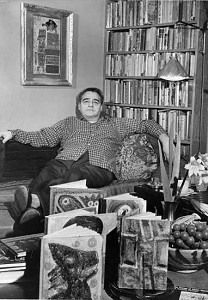
Kenneth Patchen (13 december 1911 – 8 januari 1972)
De Franse schrijver Jean Rouaud werd geboren op 13 december 1952 in Campbon (Loire-Atlantique). Zie ook alle tags voor Jean Rouaud op dit blog.
Uit:The World More or Less (Vertaald door Barbara Wright)
“I who dread the company of men, whose conversations weary me, it was just my luck, after eight years of strict boarding-school discipline (the only femi-nine presence being provided by three old nuns with adolescent moustaches), to find myself now among the members of the Logreean Club’s reserve team, in the bleak rustic changing room erected alongside what you would have thought was a ploughed field, were it not for its chalk lines and goalposts. And this without any particular incli-nation on my part, unless, for want of anything better, as a time-honoured cure for Sunday boredom. But the weather was fit to freeze the tail off a brass monkey. Hence the haste of most of the players, when the final whistle blew, to take refuge within the four jerry-built walls of the shack, everyone making a point of knocking the mud off his boots against the concrete doorstep, thus leaving the ground strewn with cakes of earth punched full of stud holes, before making his way to his place, indicated by the hunchbacked peg his clothes are hanging on, and sitting down more or less wearily, according to his real or suggested state of fatigue, on the communal bench run-ning round the little room that reeks of the combined effluvia of camphorated oil and perspiration. A makeshift shelter: it has rectangular patches of cement between grooved uprights, a green metal door with wired glass which, with the little skylight in the comer over by the showers, allows in the feeble grey light of the winter afternoon, a single-sloping corrugated roof made of some composite material, but this provides sufficient protection against the Atlantic’s blend of wind, intense cold and rain, which paralyses the rare spectators now huddling under the awning of the refreshment bar, who make one wonder what pleasure they can possibly derive from such less than fascinating events.
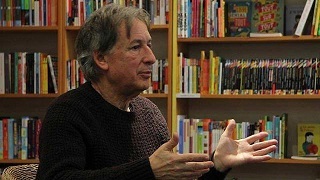
Jean Rouaud (Campbon, 13 december 1952)
De Nederlandse schrijfster Ida Vos (meisjesnaam Gudema) werd geboren in Groningen op 13 december 1931. Zie ook alle tags voor Ida Vos op dit blog.
Uit: Terugkeer
“Jij mag straks, Sallo. Eerst ik.
‘…Leise flehen meine Lieder durch die Nacht…’
Ik moet eten.
Ik heb geen honger.
Mamma propt stukjes brood in mijn mond.
Ik wil niet! Ik bijt in mamma’s hand.
‘Au verdomme, nog allemaal echt,’ zegt mamma.
Ik ben echt.
Ik hou mijn mond stijf dicht.
‘Als je niet eet ga je dood, Claartje.’
Mamma, in haar slagersjas, is sterk.
Ik moet mijn mond open doen.
‘Vieze meid. Alles over mijn schone jas. Hou op. Als je niet eet…’
Ik eet wel weer. Ben ik lief, mamma? Ik zal het niet meer doen. Ik zal nooit meer overgeven.
Daar zit Sophie. Waarom zeg je niks?
Rechtop, Sophie. Hang niet zo scheef in je kinderwagentje.
Wacht, ik zal je helpen. Ga je mee naar school? Gil niet zo, Sophie. Ik ben het. Ik doe je geen kwaad.
Is het vrijdag? Dan moet ik gauw naar huis. De kip opzetten. Pappa komt thuis.
‘Waar gaan we naar toe, Claartje?’
‘Naar huis, mamma. Het is bijna sjabbes.Ik moet de kip opzetten.’
‘Ik doe het wel. Jij hebt de hele week gewerkt. Rust maar lekker uit.’ Mamma legt mijn hoofd tegen haar jas. De jas ruikt wit.
‘Kusje mamma. Ben ik lief?’
‘Je bent een schatje, Claartje. Kusje.’
Mamma heeft warme lippen en warme borsten… melk voor Sallo.
‘Niet knijpen, Claartje. Je moet niet zo hard in mijn borst knijpen. Dat doet pijn. Stoute Claar.’
‘Stoute mamma.’

Ida Vos (13 december 1931 – 3 april 2006)
Groningen in de Adventstijd
De Schotse dichter William Drummond werd geboren op 13 december 1585 in Hawthornden, in de buurt van Edinburgh. Zie ook alle tags voor William Drummond op dit blog.
De Bell Of St. Michel
Go ‘way, go ‘way, don’t ring no more, ole bell of Saint Michel,
For if you do, I can’t stay here, you know dat very well,
No matter how I close ma ear, I can’t shut out de soun’,
It rise so high ‘bove all de noise of dis beeg Yankee town.
An’ w’en it ring, I t’ink I feel de cool, cool summer breeze
Dat’s blow across Lac Peezagonk, an’ play among de trees,
Dey’re makin’ hay, I know mese’f, can smell de pleasant smell
O! how I wish I could be dere to-day on Saint Michel!
It’s fonny t’ing, for me I’m sure, dat’s travel ev’ryw’ere,
How moche I t’ink of long ago w’en I be leevin’ dere;
I can’t ‘splain dat at all, at all, mebbe it’s naturel,
But I can’t help it w’en I hear de bell of Saint Michel.
Dere’s plaintee t’ing I don’t forget, but I remember bes’
De spot I fin’ wan day on June de small san’piper’s nes’
An’ dat hole on de reever w’ere I ketch de beeg, beeg trout
Was very nearly pull me in before I pull heem out.
An’ leetle Elodie Leclaire, I wonner if she still
Leev jus’ sam’ place she use to leev on ‘noder side de hill,
But s’pose she marry Joe Barbeau, dat’s alway hangin’ roun’
Since I am lef’ ole Saint Michel for work on Yankee town.
Ah! dere she go, ding dong, ding dong, its back, encore again
An’ ole chanson come on ma head of ‘a la claire fontaine,’
I’m not surprise it soun’ so sweet, more sweeter I can tell
For wit’ de song also I hear de bell of Saint Michel.
It’s very strange about dat bell, go ding dong all de w’ile
For when I’m small garçon at school, can’t hear it half a mile;
But seems more farder I get off from Church of Saint Michel,
De more I see de ole village an’ louder soun’ de bell.
O! all de monee dat I mak’ w’en I be travel roun’
Can’t kip me long away from home on dis beeg Yankee town,
I t’ink I’ll settle down again on Parish Saint Michel,
An’ leev an’ die more satisfy so long I hear dat bell.
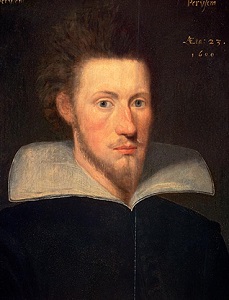
William Drummond (13 december 1585 – 4 december 1649)
Anniem portret uit 1609
Zie voor nog meer de schrijvers van de 13 december ook mijn blog van 13 december 2017 en ook mijn blog van 13 december 2015 deel 2 en eveneens deel 3.

